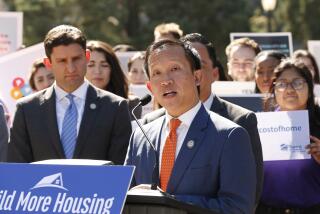Lawyers for U.S. Seek End to Myanmar Boycott
- Share via
WASHINGTON — Clinton administration lawyers chose free trade over human rights Tuesday, saying cities and states may not boycott companies that do business with repressive regimes abroad.
The United States must speak with “a single, national voice” in the global economy, the administration said, and it urged the Supreme Court to rebuke Massachusetts for refusing to buy from firms that do business with Myanmar, formerly known as Burma.
If the high court agrees, its decision probably will strike down similar laws in at least a dozen cities, including Los Angeles, San Francisco, Oakland and Portland.
The Massachusetts case, to be argued next month, tests whether cities and states can consider moral standards when doing business.
In 1996, it became the first state to formally boycott firms that do business with the military regime in Myanmar.
During the 1980s, many American cities, states and colleges announced that they would not do business with the apartheid regime in South Africa or with companies that operated there. But those laws, while unpopular with corporate leaders, went unchallenged in court.
Over the last decade, concerns over human rights, the environment or forced labor have figured in boycotts announced by cities and states. China, Cuba, Nigeria, Sudan and Switzerland have been targeted by boycott laws.
States need not “trade with dictators,” lawyers for Massachusetts said in defending its Myanmar law. “The states should be free to choose their trading partners . . . and to apply a moral standard to their spending decisions,” they argued.
The law posed a high-stakes dilemma for businesses, since the state made purchases of more than $2 billion per year. As a practical matter, they were forced to choose between doing business with the state or Myanmar.
Two years ago, the National Foreign Trade Council, a coalition of American and foreign firms, filed suit in Boston and contended that the state was unfairly discriminating against them. The European Union and Japan also protested the Massachusetts law.
Last year, the U.S. Court of Appeals struck it down as unconstitutional, leading to a showdown March 22 in the Supreme Court, when the case will be argued.
In siding with the corporations, administration officials said they feared the specter of 50 foreign policies, one for each state, and perhaps many more if more cities joined in.
“The ultimate authority to act on behalf of the United States . . . in the international arena resides with the president and Congress alone,” U.S. Solicitor General Seth Waxman said in his brief to the high court. Cities and states “impermissibly intrude into the national government’s exclusive authority over foreign affairs” if they use their purchasing power to condemn human rights abuses abroad, he said.
Massachusetts Assistant Atty. Gen. Thomas Barnico said he had not seen the administration’s brief and refused to comment.
Lawyers for California and 21 other states supported Massachusetts, as did a group of major cities, including Los Angeles and San Francisco.
Georgetown law professor Robert Stumberg, who filed a brief supporting the state, said he was disappointed but not surprised by the administration’s stand.
“Massachusetts is not regulating anybody or saying you can’t do business here,” Stumberg said. “They are just saying: ‘We the people of Massachusetts don’t want to do business with you under these circumstances.’ ”
More to Read
Sign up for Essential California
The most important California stories and recommendations in your inbox every morning.
You may occasionally receive promotional content from the Los Angeles Times.














